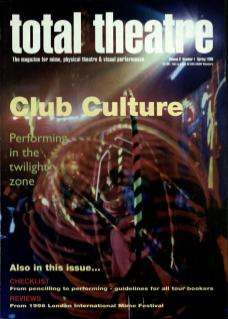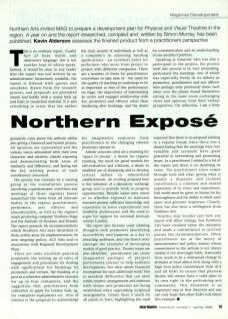This is no ordinary report. Usually full of buzz words and obstructive language, this is not another load of admin-speak. Indeed, it would be clear to any reader that the report was not written by an administrator! Immensely readable, the report is littered with quotes and anecdotes drawn from the research process, and proposals are presented clearly and boldly with a sound back up and basis in researched material. It is also refreshing to sense that the author genuinely cares about the artform whilst also giving a balanced and honest picture. All opinions are represented and the various voices articulated with their own character and identity, clearly exposing and demonstrating both areas of similarity and difference, and laying out the key starting points of each constituency concerned.
The process was overseen by a steering group as the consultation process (involving a questionnaire, interviews and meetings at three regional bases) researched the views from all relevant bodies in the region; practitioners, performers, arts officers and educationalists, as well as the region's major producing company Northern Stage and the Festivals of Stockton and Kendal. The report presents 66 recommendations which Northern Arts have identified in three action areas for implementation; its own ongoing policy, ACE bids and in association with Regional Development Plans.
There are some excellent practical proposals; the setting up of rules of engagement and procedures for dealing with applications for bookings by promoters and venues, the funding of a post as a collective administrative resource for up to four companies, and the suggestion that practitioners form collectives to apply for Lottery bids, e.g. for computer equipment etc. Also of interest is the proposal to acknowledge the track records of individuals as well as a company's in assessing funding applications – an excellent point for performers who move from project to project with different companies. There are a number of items for practitioners everywhere to take note of: the need for the quality of teaching in workshops to be as important as that of the performance on stage, the importance of maintaining an active and engaged relationship with key promoters and officers other than hankering after bookings, and the desire for imaginative responses from practitioners to the changing climate promoters operate in.
Artistic concerns cited are a yearning for 'space to dream', a desire for regular training, the need for good models for self-evaluation and criticism, a desire to establish use of a dramaturg and to develop critical debate in educational establishments. An exciting proposal here is the initiation of a laboratory exchange group, and to provide work in progress opportunities. Broader issues were raised as to whether regional or national assessors possess sufficient knowledge and experience to assess experimental and disability performance and the need to argue for support for national festivals outside London.
The report also includes some sobering thoughts, with promoters identifying accessibility and humour as a key to attracting audiences, and one horror story amongst the examples of developing models of good practice. Thorny issues are also identified – practitioners can create imaginative packages of pre/post performance contact to help audience development, but what about financial recompense for such additional work? Not to mention difficulties that can arise whilst creative arrangements and relations with venues and promoters are being established when negotiating reciprocal arrangements. Clearly there is much for all parties to learn, highlighting the need for communication and an understanding of one another's position.
Speaking as someone who was also a participant in the project, the process itself also proved to be very interesting, particularly the meetings, one of which was especially lively in its debate as promoters, practitioners and arts officers who perhaps only previously knew each other over the phone found themselves sitting in the same room exchanging views and opinions from their various perspectives. On reflection, I am a little surprised that there is no proposal relating to a regular forum since there was a shared feeling that the meetings were very valuable and certainly have great potential in networking and promoting issues. As a practitioner I related to a lot of the report and there is no doubting its value. The practitioner’s voice comes through loud and clear, giving what is usually a disparate and isolated constituency a common and shared expression of its views and experiences. Full credit must be given to Simon for his thoroughness and his ability to illicit such open and genuine responses. Clearly, there has also been a willingness from Northern Arts.
Sceptics may wonder just how any report will affect change, but Northern Arts have certainly taken the initiative and made a commitment to actively pursue the recommendations. Often practitioners are at the mercy of administrators and policymakers whose commitment to the artform is not always reliable if not downright fickle. Nationally there needs to be a widespread change in attitudes at local officer level along with a high level policy commitment from ACE and all RABs to ensure that physical theatre will always have a valid place in its own right in the performing arts community. This document is an important step in that direction and one can only hope that other RABs will follow this example.

